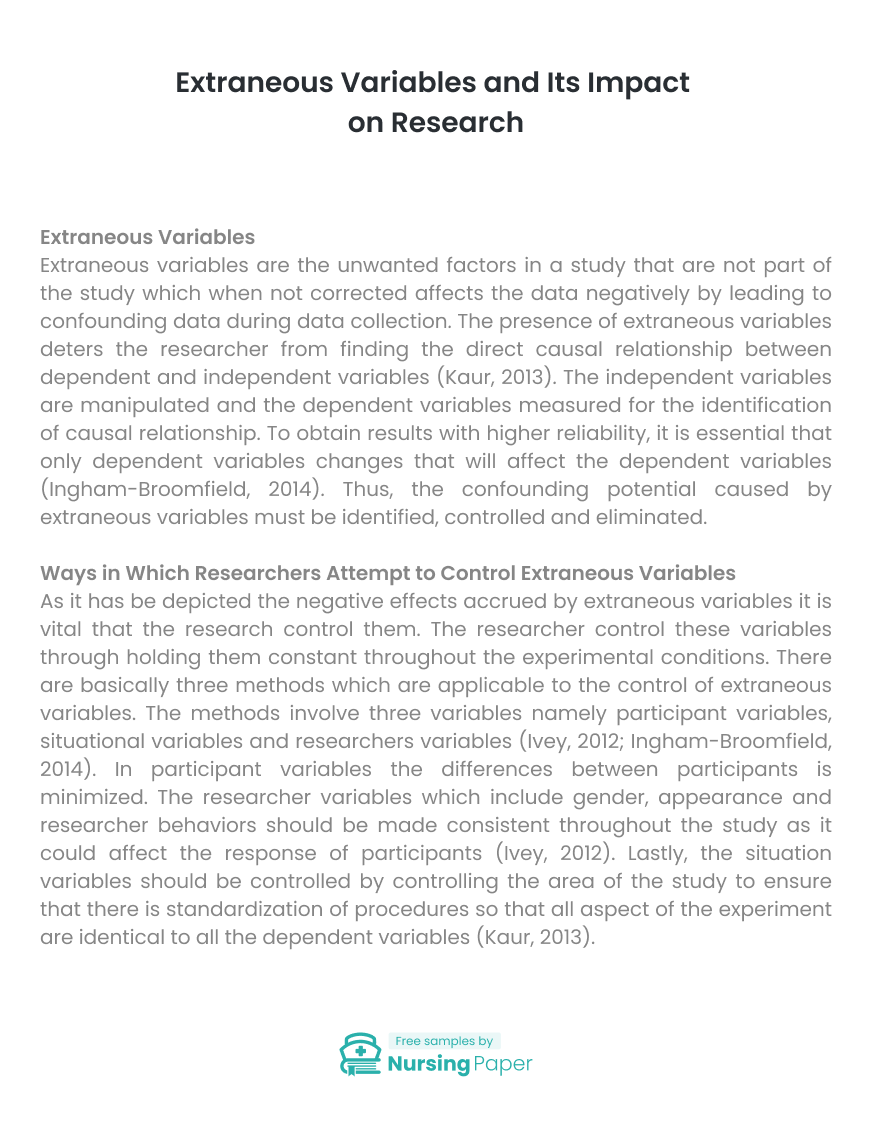
Extraneous Variables and Its Impact on Research
Extraneous Variables
Extraneous variables are the unwanted factors in a study that are not part of the study which when not corrected affects the data negatively by leading to confounding data during data collection. The presence of extraneous variables deters the researcher from finding the direct causal relationship between dependent and independent variables (Kaur, 2013). The independent variables are manipulated and the dependent variables measured for the identification of causal relationship. To obtain results with higher reliability, it is essential that only dependent variables changes that will affect the dependent variables (Ingham-Broomfield, 2014). Thus, the confounding potential caused by extraneous variables must be identified, controlled and eliminated.
Ways in Which Researchers Attempt to Control Extraneous Variables
As it has be depicted the negative effects accrued by extraneous variables it is vital that the research control them. The researcher control these variables through holding them constant throughout the experimental conditions. There are basically three methods which are applicable to the control of extraneous variables. The methods involve three variables namely participant variables, situational variables and researchers variables (Ivey, 2012; Ingham-Broomfield, 2014). In participant variables the differences between participants is minimized. The researcher variables which include gender, appearance and researcher behaviors should be made consistent throughout the study as it could affect the response of participants (Ivey, 2012). Lastly, the situation variables should be controlled by controlling the area of the study to ensure that there is standardization of procedures so that all aspect of the experiment are identical to all the dependent variables (Kaur, 2013). Moreover, there should be random assignment so that the participants have equal chance of being assigned to any particular experimental condition.


1. Ingham-Broomfield, R. (2014). A nurses’ guide to Quantitative research. Australian Journal of Advanced Nursing, The, 32(2), 32.
2. Ivey, J. (2012). The value of qualitative research methods. Pediatric nursing, 38(6), 319.
3. Kaur, S. P. (2013). Variables in research. Indian J Res Rep Med Sci, 4, 36-8.



The download will start shortly.

The download will start shortly.
 Subject:
Health and Social Care
Subject:
Health and Social Care  Number of pages: 9
Number of pages: 9  Subject:
Medicine
Subject:
Medicine  Number of pages: 5
Number of pages: 5  Subject:
Health and Social Care
Subject:
Health and Social Care  Number of pages: 2
Number of pages: 2  Subject:
Medicine
Subject:
Medicine  Number of pages: 3
Number of pages: 3  Subject:
Health and Social Care
Subject:
Health and Social Care  Number of pages: 1
Number of pages: 1  Subject:
Medicine
Subject:
Medicine  Number of pages: 2
Number of pages: 2  Subject:
Health and Social Care
Subject:
Health and Social Care  Number of pages: 6
Number of pages: 6  Subject:
Medicine
Subject:
Medicine  Number of pages: 6
Number of pages: 6  Subject:
Health and Social Care
Subject:
Health and Social Care  Number of pages: 9
Number of pages: 9  Subject:
Nursing
Subject:
Nursing  Number of pages: 5
Number of pages: 5  Subject:
Medicine
Subject:
Medicine  Number of pages: 5
Number of pages: 5  Subject:
Health and Social Care
Subject:
Health and Social Care  Number of pages: 2
Number of pages: 2  Subject:
Medicine
Subject:
Medicine  Number of pages: 5
Number of pages: 5  Subject:
Health and Social Care
Subject:
Health and Social Care  Number of pages: 5
Number of pages: 5  Subject:
Medicine
Subject:
Medicine  Number of pages: 2
Number of pages: 2 
